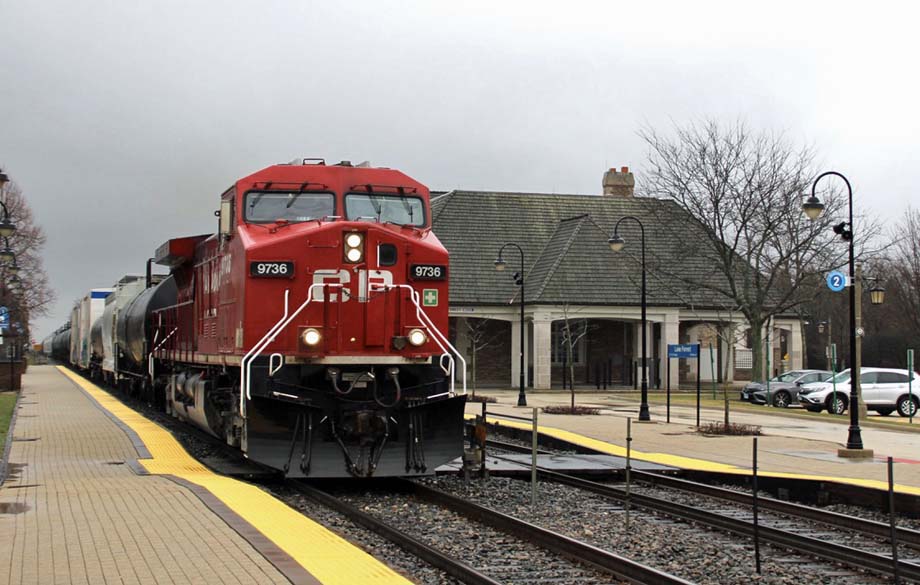
Washington District of Columbia USA - Federal regulators imposed a number of conditions on the
merger of CPKC, including a novel way of enforcing the railways' promise to not tamper with current
interchanges.
Nearly all of the conditions were proposed by CP and KCS themselves as part of the Surface Transportation Board's
(STB) merger review process.
"This seems like a clear win for CP without any material conditions," Wolfe Research analyst Scott Group
wrote in a note to clients.
"CP will not be required to divest any track, and the decision didn't grant any trackage rights or competitive
access like in prior mergers."
The conditions the board did impose will be monitored through an unprecedented seven-year oversight period, during
which CPKC will have to provide data that will allow regulators to determine whether the merged railroad is living up
to its promises.
Chief among them, keeping gateways open on commercially reasonable terms and to create no new bottlenecks at
interchanges such as Laredo, Chicago, and Kansas City.
To enforce CPKC's pledge, the STB will require the railroad to provide a shipper with a written justification for any
interline rate increase that's higher than the rate of inflation.
CPKC also will be required to arbitrate gateway rate disputes with shippers.
Shippers rarely bring rate complaint cases to the STB because the agency's processes are so complicated, expensive, and
time-consuming.
STB Chairman Martin J. Oberman said the strength of gateway protections is unprecedented due to concerns that CPKC
could manipulate its rates and crimp other railroads' cross-border traffic at the key Laredo gateway.
If CPKC's written explanation regarding a rate hike doesn't pass muster with the shipper, Oberman says they'll be able
to challenge the rate on an expedited timetable, he says.
The conditions also lay out a dispute resolution mechanism, which the board says it modified and improved, that covers
potential freight train interference with Metra commuter trains in the Chicago area.
Metra had raised concerns about projected freight train increases on lines shared with commuter trains.
Oberman, who was once Metra's chairman, said that as part of the STB's oversight of the merger there will be detailed
scrutiny of CPKC and Metra performance metrics.
In a catch-all condition, the STB is requiring CPKC to live up to various commitments it made during merger
proceedings.
Among them:
Honour the settlement agreement with Amtrak, including CP's agreement to support certain planned expansions of Amtrak
passenger service.
Retain reciprocal switching access for any shipper facility that's currently directly served by CP or
KCS.
Cooperate with Union Pacific and BNSF Railway to ensure adequate capacity along the CPKC's trackage rights across
Texas.
Keep St. Paul, Minn.-Kansas City freight trains off Metra lines in the Chicago area unless otherwise agreed to by CPKC
and Metra, or in the event of an emergency.
CPKC plans to run those freights on its direct route through Iowa, but Metra feared they may run the long way around
via Chicago.
As modified by the board, extend the terms of the hazardous chemical tariff settlement agreement reached with Bayer
Crop Science LP to other eligible shippers.
CPKC will be required to shift its crew change location near Ottumwa, Iowa, to a point farther southwest on the CP
Laredo Subdivision to eliminate potential conflicts with nearby BNSF Railway movements.
It also must abide by an agreement reached with regional Iowa Interstate over the Davenport, Iowa,
gateway.
The STB has typically imposed a five-year oversight period on mergers, but felt a seven-year period was justified to
ensure that the merger goes as planned.
The data that CPKC will be required to regularly submit to the STB includes numerous service, operational,
competition-related items.
The remaining conditions were boilerplate items such as requiring that CPKC comply with oversight conditions,
post-merger service promises, its safety integration plan, New York Dock labor protections, and required environmental
mitigation projects.
Bill Stephens.
(likely no image with original article)
(usually because it's been seen before)
provisions in Section 29 of the Canadian
Copyright Modernization Act.

